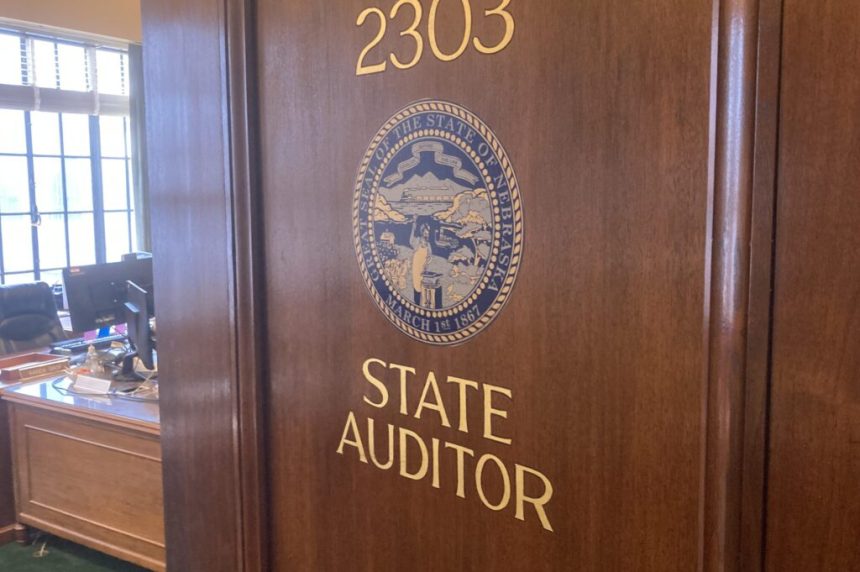The Nebraska State Auditor’s Office is located in the State Capitol. (Paul Hammel/Nebraska Examiner)
LINCOLN — State Auditor Mike Foley in a new report this week accused the mayor of a small western Nebraska town of possibly misusing public equipment and resources for the mayor’s personal benefit, including spraying a weedy area near his driveway with a city-owned utility vehicle.
Foley also raised eyebrows about “excessive” city payments to the mayor’s “Handyman” business.
The auditor on Tuesday released a 20-page report to the Panhandle City of Mitchell detailing findings and including photos. One image, for example, purports to show Paul Murrell, the mayor of the town with a population of less than 2,000 people, using a city-owned weed sprayer vehicle in an area near his home.
State Auditor Mike Foley’s office released results of a probe that in part alleges the mayor of Mitchell, Nebraska, used public property for his own benefit. The report included a photo that purports to show the mayor spraying weeds with a city utility vehicle on a public road outside his house. (Courtesy of Nebraska Auditor report)
When questioned, Murrell reportedly denied allegations and said the vehicle in question was his own and provided a sales and tax statement. Foley’s team dug deeper and, with assistance from the Scotts Bluff County Sheriff’s Office, said it “confirmed” that the vehicle in the photo was city property.
“I am amazed that anyone, especially a government official, would attempt to mislead my auditors,” Foley wrote in a statement. “Do they really think that we won’t verify the information provided?”
Murrell did not respond to the Nebraska Examiner’s request for comment.
Mitchell City Council President Sean Hopkins said Tuesday the city had no additional comment at this time.
The city’s general response in the report said its leaders do not “take lightly the matters brought forward” and intend to improve. The response says the city plans to implement a policy more clearly prohibiting the personal use of city resources by employees or public officials. It said the city also was taking steps to review all records and agreements, audit all accounts and update policies to ensure an “efficient and transparent system.”
Foley pointed out state law that prohibits intentional obstruction of the auditor and said his team would forward all documentation to the Scotts Bluff County Attorney’s Office, the Nebraska Attorney General’s Office and the Nebraska Accountability and Disclosure Commission for review.
He said Mitchell’s mayor had given the state audit team an all-terrain vehicle and utility-type vehicle sales and use tax form to support his claim that he owned the utility vehicle shown in the photo.
“Likely ignorant of that statutory prohibition and the attendant criminal penalty, the mayor appears to have tried unsuccessfully to dupe Foley’s audit team with a deceptive sales tax form,” Foley said.

State Auditor Mike Foley (Courtesy Nebraska State Auditor’s Office)
In addition, the auditor’s team went through bank statements, City Council meeting minutes, claims listings and invoices to identify “several questionable payments” made between January 2023 and this past March from the bank accounts of a city-owned assisted living and nursing facility in Mitchell called The Center.
Over that same period, the report said, Murrell’s Handyman business received 12 payments from The Center totaling $47,448. The auditing team said the City Council approved only nine of the payments, totaling about $30,450.
“This apparent lack of approval by the City Council means that the mayor would have unilaterally authorized and signed the payments to his business, as he is an authorized user on the Center’s bank accounts,” the report said.
Auditors alleged that the approval process could have run afoul of the Nebraska Political Accountability and Disclosure Act.
The city, in response, told the auditing team that The Center’s administrator did not relay any concerns regarding work performed by the mayor and said the mayor has performed “a significant amount of pro-bono work” for the city and The Center.
City leadership told auditors that any missing transactions would have been due to omissions by The Center’s administrator, who was responsible for bills presented to the City Council.
Foley said Mitchell taxpayers alerted his office to some of the issues in the report, which prompted the auditor’s investigation.









